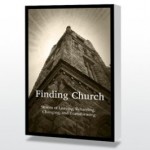When I left the church for good…
This post is part of a short series based on Jeremy Myer’s (from “Till He Comes“) book project “Finding Church.” Jeremy asked for contributions in the categories of Changing Church, Leaving Church, Reforming Church, and Returning to Church. As I worked through my own contribution, I realized that my story could fit into any of the categories. So, I’m writing a post based on each category.
This post describes when I “left church.” This is how Jeremy describes this category: “These are stories of people who felt that ‘going to church’ was inhibiting their walk with Jesus, and so left the institutional church to follow and serve Jesus in other ways.”
Of course, I already told most of this story in my previous post about “changing church.” But, in this post, I’m able to point out what I’ve “left.” Because, as I explained in that previous post, I didn’t leave the church – it’s impossible to leave the church that God is putting together once he places someone among his family.
However, I did leave “the church” – that organizational, institutional, locational version. This is the entity or location that people refer to when they ask questions like, “Where do you go to church?” or “What did you do in church today?” or “Have you joined our church yet?”
I’ve left the programs and the hierarchies and the vocations and the positions and offices.
The church is not a place that someone can go to, nor is it an event that someone can attend, nor is it an organization that someone can choose to join or not.
The church is the family of God, the body of Christ, the dwelling place of the Holy Spirit. I’m still part of that church, and I always will be. If you are in Christ, then you are part of that church with me.
It’s the other “church” that I left. And, guess what? There are people who remain part of that “church” who are also part of the church with me. Even if they never leave “the church,” they remain part of the church of God by identity, in the same way that I’ve always been part of that church and will always be part of that church.
So, I’ve left “the church.” But, in a way, my heart remains tied (through mutual relationship with God) to the hearts of those who are still part of “the church” – in the same way that my heart is tied to all who are part of God’s family.
Want to relate as church instead of organization? Don’t forget these hurdles…
Felicity at “Simply Church” has written a great post called “10 hurdles to overcome in making the transition from legacy to simple church.” Her post is a reminder to those who are interested in seeing church shift from organization-based to relational-based in our mutual relationship with God through Jesus Christ.
I’m guessing that Felicity has had some of the same conversations that I’ve had. I’ve talked with many followers of Jesus Christ – both those who find themselves in “church leadership” and those who do not – who are interested in living as the church as demonstrated in Scripture. But, there are hurdles to overcome, even for those who want to see this kind of change.
Here are a few of the hurdles that Felicity mentions:
2. People are scared they will lose the friendships and sense of community that’s been created over the years.
3. People are used to a professional standard of church: a worship band, well-prepared sermon etc.
7. How can you prevent heresy?
Felicity lists other “hurdles” on her site. Make sure you check them out.
The transition is not an easy one, even for people who love God and one another, and for people who seek to gather in ways that allow them to encourage one another and help one another grow in maturity in Christ. The transition is especially difficult when the people have only been taught one way to gather as the church and have never experiences anything different.
Be patient with yourself, with others, and with God as he worked through all of you together.
When I changed churches…
This post is part of a short series based on Jeremy Myer’s (from “Till He Comes“) book project “Finding Church.” Jeremy asked for contributions in the categories of Changing Church, Leaving Church, Reforming Church, and Returning to Church. As I worked through my own contribution, I realized that my story could fit into any of the categories. So, I’m writing a post based on each category.
This post describes when I “changed church.” This is how Jeremy describes this category: “These are stories of people who, for numerous different reasons, left one church to join another.”
Now, I grew up as part of various different “churches.” In reality, each of these was a organization, not the church. Don’t misunderstand me… the church was there – the people of God were present – but what I understood as “church” was actually the organization, not the people.
During that time, I “changed churches” many times and for different reasons. Usually, we “changed churches” because we moved. Only a few times we “changed churches” even though we stayed in the same city. Interestingly, we never “changed churches” because of problems with leadership.
In reality, I was really changing organizations. I was leaving one organization to be part of another organization. Of course, I was also breaking relationships with part of God’s family and inserting myself and my family into the lives of other people who are part of God’s family. But, I didn’t really see either one was the church.
But, a few years ago, I changed “church” for the last time. Why? Because my understanding of what the church is changed. It’s not an organization that can be joined or left. Church is the people of God, saved by faith in Jesus Christ, indwelled by the Holy Spirit, and gathered together by God according to his grace and purposes.
When I’m with the people of God, I’m part of the church with them. And, in fact, we are members together of the body of Christ whether we realize it or accept it or not. Our relationship with one another and our identity as the church of God does not depend upon our decision. Instead, it depends completely on God. We simply interact with one another as directed by the Spirit to help one another grow and mature in our walk with Jesus Christ.
So, a few years ago, I changed to a different church for the last time. I changed from “church” as an organization to church as the people of God. Actually, I have always been part of this church, even though I didn’t understand it. And, I will always be part of that church.
What about you? Have you changed churches?
A great run of guest blog posts
Over the last 12 weeks, I’ve posted 13 different “guest blogger” posts. I usually publish one guest post per week on Monday mornings. (One week, I posted a two part post, which is why it is 13 posts in 12 weeks.) All of these posts were sent in by readers, and they all generate some great discussion on the blog, on Facebook, and in real life.
Occasionally, I ask specific people to write guest posts for me. But, usually, people send me emails or Facebook messages or even leave comments on this blog about writing a guest post here.
If you’re interested in writing a guest post, please contact me. The easiest way to contact me is to email me at aknox [at] sebts [dot] edu.
I only have two requests about guest posts: 1) The post should relate to the church, and 2) The post should be less than 1000 words. (If the post is more than 1000 words, then I would prefer to split it into multiple posts.)
So, if there is something that you’d like to write or a question that you’d like to ask or some ideas that you’d like to toss around, send me an email or contact me here or on Facebook. I’ll be glad to publish your “guest blogger” post.
Finding Church: the book project and the blog series
Jeremy at “Till He Comes” is putting together a book project called “Finding Church.” The subtitle of the book is “Stories of Leaving, Returning, Changing, and Transforming.” Last week, Jeremy provided a list of contributors in his post “Finding Church Contributors.”
In his post, Jeremy lists the contributors in each of four categories: Changing Church, Leaving Church, Reforming Church, and Returning to Church. I’m currently listed under all of those lists in the nefarious category of “Not Sent in the Story (but said they will!!!).” My story is complete and is on its way to Jeremy. Hopefully, he’ll decide to use it.
(By the way, it looks like he will still accept submissions in the next week if you’re interested in taking part in his project.)
I’m excited about reading different people’s stories. I find that God usually uses these stories to help me understand where other people are in their journeys with Christ.
I’m also excited about taking part, and I’m excited about the story that I’ve submitted. To be honest, I’ve been in a bit of a writing slump lately, and I have two big writing projects that I need to finish. So, hopefully, this will jump-start my own writing.
But, also being honest, when I start writing my submission, I struggled with which category to write for. In fact, in some ways, different parts of my own story could fit in each of the four categories in Jeremy’s project: Changing Church, Leaving Church, Reforming Church, and Returning to Church.
In the end, I decided to write on the topic of “Reforming Church.” Although, like many things that I write, I perhaps took a little different view of “Reforming Church” than you might expect.
However, I did enjoy thinking through each of the four categories, and I don’t want to lose those thoughts. So, I’ve decided to write a short blog series to go along with Jeremy’s book project.
For the next four days (five posts counting this one), I’m going to look at each of the four categories of Jeremy’s upcoming book Finding Church. I’ll write about how my own journey with Jesus Christ can fit into the categories of changing church, leaving church, reforming church, and returning to church.
But, what about you? If you were to write about your own journey with Jesus Christ, which of those categories do you think your life would best fit in? Why would you pick that category?
Scripture… As We Live It #208
This is the 208th passage in “Scripture… As We Live It.”
But even if you should suffer for righteousness’ sake find yourself in a debate with an unbeliever, you will be blessed. Have no fear of them, nor be troubled, but in your hearts arguments honor Christ the Lord as holy, always being prepared to make a defense to anyone who asks you for a reason for the hope that is in you debates you; yet do it with gentleness and respect, having a good conscience good philosophical foundations and sound logic, so that, when you are slandered, those who revile your good behavior in Christ position may be put to shame. (1 Peter 3:14-16 re-mix)
(Please read the first post for an explanation of this series.)
Replay: We have permission to serve
Two years ago, I wrote a post called “Permission to Service.” The post was actually the conclusion to a short series on the topic of women serving. However, this post is not just about women. It’s about all of us. In Christ, we are all part of the New Covenant priesthood, and through his Holy Spirit, we are all called and empowered to serve God by serving others. In other words, we all have permission to serve. We do not have to get permission from anyone else. Your permission and your commission comes directly from God – who also directs you and empowers you to serve.
——————————
Permission to Serve
This post is the final post in my series on “women in ministry,” or, as I like to say, “women serving others.” (see “Spiritual Gifts and Women,” “Spiritually Gifted Women,” and “Women Serving in Context“) However, this post is not about women specifically. Instead, it’s about all of us, including women.
Originally, this post was titled “Serving for the Rest of Us.” But, my friend Wes from “a mission-driven life” left a comment on facebook about some of the previous points in this series. His comment gets to the point of this post, so I took the title from his comment, and even changed a few things in the post to go along with his comment. This is what Wes said:
[W]hat I really liked about the post is that you distinguish between gifts and offices. I agree with you. And while your post is about women, its also about other people, like me, who isn’t serving in an office, like elder or deacon, but who believes that I can still serve the church with the gifts God has granted me, without feeling like I need “permission” to serve.
Women and men are gifted by God through the Holy Spirit in various ways for various types of service and various opportunities to serve. God gives these spiritual gifts according to his will so that we can serve one another. When we serve one another, we bring glory to God.
When we use terms like “ministry” instead of “service,” we often make service into something that only certain people can do. If this perception hinders us from serving others, then we’ve missed something very important – important to ourselves and to others. In fact, not only are we missing something important to ourselves and others, but we are hindering the growth of the church, because the church grows when EACH believer is serving one another.
Thus, someone who is a child of God has been gifted by the Holy Spirit of God. That person has been ordained by God as a minister of God to serve other people. Failure to serve others would be similar to any other act of disobedience.
Certainly, there are contexts for service. I’ve briefly mentioned some of the passages of Scripture that could (and I think do) limit the contexts of women serving. However, there are other passages that limit the context of anyone serving. Women are not lesser servants because of certain passages any more than others are lesser servants because of other passages. The church NEEDS the service of all believers.
So, as a child of God, we are ministers together, and each of us is a minster separately. We have permission to serve. We have license to serve.
Those of us who are leaders in the church must make sure that we encourage everyone to serve, not just other leaders. Similarly, we should give opportunity for others to serve. This would include both speaking and non-speaking acts of service.
We also must realize that we are not perfect. None of us individually is perfect and we are not perfect as a group – whatever group we’re talking about. We must give each other grace and offer each other mercy as we attempt to serve one another. We will get it wrong on occasion.
Eventually, as we attempt to serve one another, someone is going to serve someone else in a manner that is considered to be incorrect. While we can help one another learn through these times (and, remember, we both need help, not just the one that we think is wrong), let’s also recognize the intent and purpose. If they purpose is trying to serve in love for the purpose of building up the body of Christ, then let’s glorify God for it!
If we only allow perfect service… then we’re in big trouble. Thank God that he is merciful and works through broken vessels. (And, before someone says it, yes, we should never be satisfied with our current level of imperfection, but should instead continue to disciple one another.)
So, to end this post where Wes began it: We have permission to serve.
Is this how Paul MEANT to write 1 Corinthians 12?
If you enjoy my series “Scripture… As We Live It,” then you will probably enjoy a new post by Ross at “Viral Jesus” called “I Cor. 12 Rewritten to Match Modern Church.”
While I tend to “re-mix” only one or two verses, Ross has modified almost an entire chapter to better match how some in today’s church live. Oh, I’m sure you’ll disagree with him here and there, but that’s not the point.
The point is: do we make Scripture say what we want it to say (and how we already live), or do we allow the Spirit to use what Scripture actually says to change us and how we live?
Here’s a short snippet of Ross’ Modern Ecclesiastical Version (MEV) from 1 Corinthians 12:12-13:
[12] The organization is a corporation with a 501(c)3 tax deductible status, though it is made up of many parts; and though all its parts are many, they form one organization. This, of course, has everything to do with the way business works. [13] For we were all organized by the denomination into one organization—whether Americans or those other people, rich or poor —and we were all given the one set of doctrines to profess.
Make sure you jump over to Ross’ post and read his entire re-mix of 1 Corinthians 12:12-26.
I know that some people disagree with me, but I think this is a great way to help us look at what Paul (or the other New Testament authors) actually wrote and compare that to how we actually live. It’s not always a pretty comparison.
My friends Paul and Laurel are in the Congo
A few weeks ago, I published a post called “Is God opening a door of opportunity for us in the Congo?” In that post, I explained that some friends of ours (Paul and Laurel) were moving to the Democratic Republic of Congo.
After several long flights and a few days in Entebbe, Uganda, Paul and Laurel and their four month old son Noah arrived in their new home in Isiro, DRC a couple of weeks ago.
Paul and Laurel will be working with locals to create written versions of several local, tribal languages. It sounds strange to many of us in the west, but many of the languages in that region (and in other regions around the world) are only spoken language. There is no written version. When my friends visited the area a couple of years ago, they were present when a man wrote down a story for the first time even in his native language.
Last weekend, I had a chance to Skype with Paul and Laurel – and even Noah. So far, they are getting adjusted to their new home and beginning to learn Lingala. (They have already spent alot of time learning French, which is one of the national languages of DRC.) Soon, they will begin their translation work.
I enjoyed catching up with my friends, and it’s amazing how technology (like Skype) can help us continue interacting with one another even though we are thousands of miles away.
Of course, as I explained in the post liked to above, we are also praying about how God could use us in the DRC and how God could use our brothers and sisters in the DRC to help us. That’s right… mutual edification across continents.
So, what’s going to happen? We don’t know. Paul and Laurel have already seen some opportunities, but we’re waiting both for more information, for them to meet more people in their city, and for direction from God. We trust that if he wants us to work together with our brothers and sisters in the DRC, then he will make that clear.
Still… it’s an exciting time. Already, I’m learning about more things that God is doing half way around the world.
We are part of the body of Christ with them
Jim at “Crossroad Junction” has written a very important post called “‘Us’ and ‘Them’.”
In his post, Jim points out that there is only one body of Christ. When we take an attitude of “us” vs. “them,” we are separating those whom God has brought together into one body. (By the way, this is what the authors of Scripture call “divisiveness” or “heresy.”)
Here’s a short excerpt from Jim’s post:
We can disagree, and even debate our differences, so long as you are seeking (like me) – even if imperfectly (like me) – to faithfully reflect Christ in us, among us and through us. What becomes a show stopper is when you insist that God expects me to look or act or think just like you – whether you are middle-class suburban, ‘hood, street, generation x, generation y, postmodern, or whatever.
The real Body of Christ is only “us” – you and me. We are to be co-participants in the life of Christ in us, among us and through us. We are to submit our lives one to another – as diverse and individual parts of the inclusive, wonderful, multifaceted Body of Christ.
Do we disagree? Sure. But we do not divide. Do we have differences? Yes. But we do not separate. We continue to live in fellowship (real, relational fellowship) with the brothers and sisters in Christ who God has brought into our lives. All of them – not just those we agree with or who are like us.









